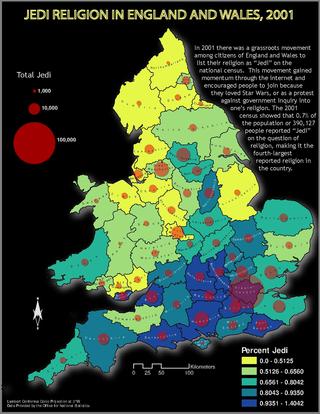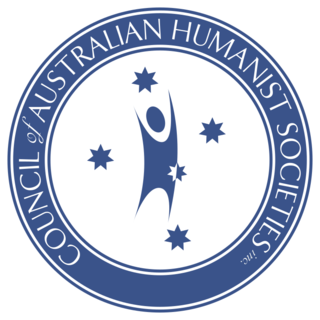Agnosticism is the view or belief that the existence of God, of the divine or the supernatural is unknown or unknowable. Another definition provided is the view that "human reason is incapable of providing sufficient rational grounds to justify either the belief that God exists or the belief that God does not exist."

Secular humanism is a philosophy, belief system or life stance that embraces human reason, secular ethics, and philosophical naturalism while specifically rejecting religious dogma, supernaturalism, and superstition as the basis of morality and decision making.
Irreligion is the neglect or active rejection of religion and, depending on the definition, a simple absence of religion.

In some national population censuses which include a question on religious identity, media report numerous respondents giving their religion as Jedi after the quasi-religious order in the Star Wars science fiction franchise. While a few individuals claim to practise Jediism sincerely, the answer can be also a joke or a protest against the religion question. While giving false information on a census form is often illegal, any religion question is sometimes an exception; in any case, prosecutions are rare. The Jedi census phenomenon sprang from a 2001 urban legend spread by chain email prior to the separate censuses that year in New Zealand, Australia, and the United Kingdom. The email asserted that any religion passing a minimum threshold would be entitled to some form of official recognition. Other reasons proffered include "do it because you love Star Wars" or "just to annoy people". The 2001 censuses recorded Jedi as 1.5% of New Zealanders, 0.37% of Australians, and 0.8% of Britons. Later censuses there and elsewhere have recorded smaller proportions. In some cases any "Jedi" responses are collected under "other" rather than reported separately.

A parody religion or mock religion is a belief system that challenges the spiritual convictions of others, often through humor, satire, or burlesque. Often constructed to achieve a specific purpose related to another belief system, a parody religion can be a parody of several religions, sects, gurus, cults, or new religious movements at the same time, or even a parody of no particular religion – instead parodying the concept of religious belief itself. Some parody religions emphasise having fun; the new faith may serve as a convenient excuse for pleasant social interaction among the like-minded.

State atheism or atheist state is the incorporation of hard atheism or non-theism into political regimes. It is considered the opposite of theocracy and may also refer to large-scale secularization attempts by governments. To some extent, it is a religion-state relationship that is usually ideologically linked to irreligion and the promotion of irreligion. State atheism may refer to a government's promotion of anti-clericalism, which opposes religious institutional power and influence in all aspects of public and political life, including the involvement of religion in the everyday life of the citizen. In some instances, religious symbols and public practices that were once held by religions were replaced with secularized versions of them. State atheism can also exist in a politically neutral fashion, in which case, it is considered non-secular.

Religion in Australia is diverse. In the 2021 national census, 43.9% of Australians identified with Christianity and 38.9% declared "no religion".

The Council of Australian Humanist Societies (CAHS) is an umbrella organisation for Australian humanist societies. It was founded in 1965. It is affiliated with Humanists International. The official symbol of CAHS is the Happy Human.
The Rationalist Society of Australia (RSA) promotes the interests of rationalists nationally in Australia. Originally formed as the Victorian Rationalist Association, the society originated in a meeting of freethinkers in the University of Melbourne in 1906. It is the operational arm of the rationalist movement in Australia.
Accurate demographics of atheism are difficult to obtain since conceptions of atheism vary considerably across different cultures and languages, ranging from an active concept to being unimportant or not developed. Also in some countries and regions atheism carries a strong stigma, making it harder to count atheists in these countries. In global studies, the number of people without a religion is usually higher than the number of people without a belief in a deity and the number of people who agree with statements on lacking a belief in a deity is usually higher than the number of people who self-identify as "atheists".
Discrimination against atheists, sometimes called atheophobia, atheistophobia, or anti-atheism, both at present and historically, includes persecution of and discrimination against people who are identified as atheists. Discrimination against atheists may be manifested by negative attitudes, prejudice, hostility, hatred, fear, or intolerance towards atheists and atheism or even the complete denial of atheists existence. It is often expressed in distrust regardless of its manifestation. The main mechanism behind anti-atheist prejudice is the projection of believers' repressed desires. Perceived atheist prevalence seems to be correlated with reduction in prejudice.

Michael Nugent is an Irish writer and activist. He has written, co-written or contributed to seven books and the comedy musical play I, Keano. He has campaigned on many political issues, often with his late wife Anne Holliday, and he is chairperson of the advocacy group Atheist Ireland.
Atheism, in the broadest sense, is an absence of belief in the existence of deities. Less broadly, atheism is a rejection of the belief that any deities exist. In an even narrower sense, atheism is specifically the position that there are no deities. Atheism is contrasted with theism, which in its most general form is the belief that at least one deity exists.

Atheism, agnosticism, scepticism, freethought, secular humanism or general irreligion are increasing in Australia. Post-war Australia has become a highly secularised country. Religion does not play a major role in the lives of much of the population.
Around 0.7 million people in India did not state their religion in the 2001 census and were counted in the "religion not stated". They were 0.06% of India's population. Their number has significantly increased 4 times from 0.7 million in the 2001 census to 2.9 million in the 2011 census at an average annual rate of 15%. According to the 2012 WIN-Gallup Global Index of Religion and Atheism report, 81% of Indians were religious, 13% were non-religious, 3% were convinced atheists, and 3% were unsure or did not respond. While a demographic study by Cambridge University Press in 2004 had found that around 2–-6% of Indians identified as atheists or irreligious.
Agnostic atheism or atheistic agnosticism is a philosophical position that encompasses both atheism and agnosticism. Agnostic atheists are atheistic because they do not hold a belief in the existence of any deity and are agnostic because they claim that the existence of a divine entity or entities is either unknowable in principle or currently unknown in fact.
Irreligion in New Zealand refers to atheism, agnosticism, deism, religious scepticism and secular humanism in New Zealand society. Post-war New Zealand has become a highly secular country, meaning that religion does not play a major role in the lives of many of the population.

Kylie Sturgess is a past President of the Atheist Foundation of Australia, an award-winning blogger, author and independent podcast host of The Token Skeptic Podcast. A Philosophy and Religious Education teacher with over ten years experience in education, Sturgess has lectured on teaching critical thinking, feminism, new media and anomalistic beliefs worldwide. She is a Member of the James Randi Educational Foundation (JREF) Education Advisory Panel and regularly writes editorial for numerous publications, and has spoken at The Amazing Meeting Las Vegas, Dragon*Con (US), QED Con (UK). She was a presenter and Master of Ceremonies for the 2010 Global Atheist Convention and returned to the role in 2012. Her most recent book The Scope of Skepticism was released in 2012. She is a presenter at Perth's community radio station RTRFM, and a winner at the 2018 CBAA Community Radio Awards in the category of Talks, with the show Talk the Talk In 2020 she was in the final eight in the Three-Minute Thesis (3MT) Asia-Pacific virtual showcase.








